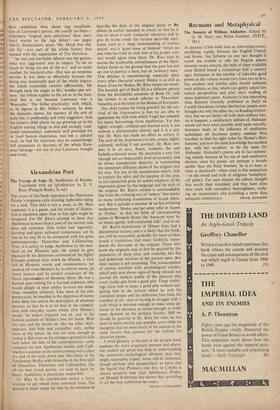Recusant and Metaphysical
ALABASTER (1568-1640) had an interesting career, oscillating rapidly between the English Church and Rome; but hitherto no one has thought it worth the trouble to edit his English poems (seventy-seven sonnets, the bulk of them available since Dobell found a manuscript half a century ago). Estimates of the number of tolerably good poems in the volume would vary from two to five; but amateur and scholar alike should welcome such editions as this, which can gently adjust his- torical perspectives and alter one's reading of more important poets. Alabaster is less interesting than Knevett (recently published in Italy) or Cardell Goodman (whose Herbertian poems were brought out only the other day at Reading Univer- sity), but we arc better off with than without him. As it happens, a satisfactory edition of Alabaster would not have been possible until quite recently. Intensive study of the influence of meditative techniques on Jacobean poetry enabled Miss Gardner to find the right order for Donne's Holy Sonnets, and now the same knowledge has enabled her, with her co-editor, to do the same for Alabaster. Alabaster's poems are in fact interest- ing, mainly because of his use of such meditative devices, since his poems are perhaps a decade earlier than the Holy Sonnets; he is at least as close as Southwell—often cited in this connection —to the mood and style of religious 'metaphysi- cal' poetry. For such reasons the editors thought him worth their attention; and they have done their work with exemplary thoroughness, study- ing six manuscripts and 'providing a more than






































 Previous page
Previous page